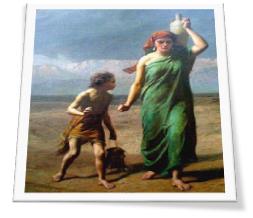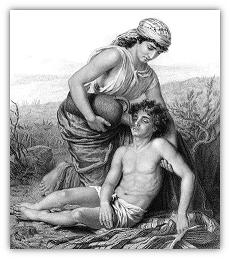The Life of Abraham: The Sending Away of Hagar and Ishmael by Abraham Genesis 21:14-21
The Life of Abraham: The Sending Away of Hagar and Ishmael by Abraham Genesis 21:14-21
For Abraham the request of Sarah to send away Ishmael was difficult after all that had happened. Ishmael had been raised under the supervision of Abraham, and he had been circumcised as a child of the covenant. For about sixteen years Abraham had seen his child growing up, and Ishmael had received an important place in Abraham's life and heart. It was therefore difficult to say farewell to him now, even though the Lord had made it a little easier by promising that He would make of Ishmael a mighty nation.
Abraham knew that Isaac, the seed of Sarah, was chosen by the Lord, but he had never expected such a separation. However, it was not only required by Sarah, but also by the Lord. This was necessary so that Abraham might see his seed in Isaac (verse 12 compared with Romans 9:7 and Hebrews 11:8). Early the next morning Abraham sent them away, but it was with a bleeding heart.
Normally when we have to do something very difficult, we are inclined to postpone it as long as possible. This was not so with Abraham, as he immediately acted upon the word of God. This is also a lesson for us. When we are convinced that something is required by the Lord, then we should not delay, even when it is difficult for our flesh. Often we see this with making confession of faith. When a boy or a girl is asked if they should not be making confession, then often the answer is, "I am not yet ready for it." This means that the Lord has to wait for us. When this is the attitude toward the service of the Lord, then we are out of the way. Take notice of the example of Abraham.
In this history we see that the Lord made a separation in the seed of Abraham. Ishmael and Isaac were both children of the covenant, but what a difference there was! Ishmael was only in an outward relationship to it, but Isaac was incorporated in it.
 It cost Abraham much strife and pain to send Hagar and Ishmael away, because the boy was his own flesh and blood. Some parents will understand something of what it then means to love the Lord above all. Circumstances in their life can arise and they have to take a firm stand, even if it leads to a separation from our children. It is a last resort, but the Lord can require it, as we see in this history. Abraham was able to do this only by faith. Later even a greater sacrifice would be asked of him, when he had to offer Isaac. This also he could do only with the help of the Lord.
It cost Abraham much strife and pain to send Hagar and Ishmael away, because the boy was his own flesh and blood. Some parents will understand something of what it then means to love the Lord above all. Circumstances in their life can arise and they have to take a firm stand, even if it leads to a separation from our children. It is a last resort, but the Lord can require it, as we see in this history. Abraham was able to do this only by faith. Later even a greater sacrifice would be asked of him, when he had to offer Isaac. This also he could do only with the help of the Lord.
God's children have to go in the way of decrease and to die every day. This is in personal life the way of mortification, but it can also take place in our family life. This requires special grace, for the Lord has to overcome our feelings and make room in our hearts for it, showing that He is righteous in all His ways. We have seen examples in which God-fearing parents have had enmity in their hearts for years regarding the loss of a child. The consequence was much unfruitfulness in their spiritual life.
For Abraham it was also difficult, but we do not find such rebellion. He rose up early in the morning and took bread and a bottle of water, and he gave it to Hagar and sent her away. Such a bottle was of skin, the material of which the earliest vessels were made (Joshua 9:4,13; Judges 4:19; 1 Samuel 16:20; Matthew 9:17). Abraham put the bottle on Hagar's shoulder, the usual place for carrying such a vessel in the Orient. He did not give it to Ishmael, who was a youth of about sixteen years, but to Hagar.
Various explanations are given regarding this sending away of Hagar. However, Wordsworth felt that since Hagar was never recognized by God as Abraham's wife, sending her away was not a case of divorce.
Some people wonder why Abraham did not give her an ass, loaded with all the necessities of life, such as food and drink and lots of money, and also a servant to protect them. Calvin gives this explanation, "Truly, either God shut his eyes, that, what he would gladly have done, might not come in his mind. Or Abraham limited her provision, in order that she might not go far from his tent. For doubtless he would prefer to have them near himself, for the purpose of rendering them such assistance as they would need."
In verse 14 there is also written that Abraham gave to Hagar her child. This seems to be a normal thing for us, but according to Oriental custom this child really belonged to Sarah. Thus Hagar could not say that injustice was done to her. She received freedom and could return to her country if she wanted to do so. She also had her son, and she was not sent away empty (25:6). In the company of Sarah there was no longer happiness possible for Hagar, for too much had happened, but above this it was the will of God. Therefore she had to leave, and she went on the way toward Egypt.
Soon she was wandering in the wilderness of Beersheba. In the hot climate of the desert the water which she had received was soon gone. Hagar must have been a strong woman, but before long Ishmael was exhausted. He became so tired and thirsty that he was not able to continue. He was supported by his mother, but when she could no longer carry him, she cast him, that is, laid him, under one of the bushes, where he at least had a little shade from the burning sun. Hagar felt that he would soon die.
 A moving picture is given of Hagar and her child in great need. There lay her fainting child, her dearest possession on earth. She could no longer look at him, and therefore she went some distance away. But as a mother she could not go far away either, only a bow shot, and there she sat down, crying in her grief. A short distance away lay Ishmael, and his lamentation also broke the silence of the desert. Nobody would hear them in such a lonesome place!
A moving picture is given of Hagar and her child in great need. There lay her fainting child, her dearest possession on earth. She could no longer look at him, and therefore she went some distance away. But as a mother she could not go far away either, only a bow shot, and there she sat down, crying in her grief. A short distance away lay Ishmael, and his lamentation also broke the silence of the desert. Nobody would hear them in such a lonesome place!
No matter how deserted the place may be and with nobody near at hand, the God of Abraham is omnipresent; He is near and far. He hears the cry of the young ravens, and He also showed mercy to the child of Abraham, His friend. God heard the voice of the lad, praying or weeping. And the angel of God (Elohim, not Jehovah) called to Hagar out of heaven. It may be inferred that there was no external appearance, such as was vouchsafed to her when she was wandering in the wilderness of Shur (16:7).
Not Hagar's cry, but that of Abraham's son went up into the ears of the Lord. Once more Hagar was directed to a well of water, but this time by an "angel of God"; not as before by the "angel of Jehovah." Why this difference? Keil, a well-known German theologian (1807-1888), says, "Hagar and Ishmael have now been removed from the care and superintendency of the Covenant God to the guidance and providence of God, the ruler of all nations." This means that the covenant bond was broken. Is it not the same when some-one has turned away from the truth and makes his choice for the world? This is a very dangerous step in our life, because it is very seldom that you see such people return to live under the truth. May the Lord keep us so that we will not wander away, since we then close the door ourselves.
The Lord saw Ishmael in his helpless condition in the desolate wilderness. And the angel commanded Hagar to lift Ishmael up and hold him in her hand. Literally it means: bind fast thy hand to him, that is, "Give him thy support now and take care of him till he reaches manhood." The Lord had promised to make him a great nation (16:10; 17:20). This means that God did not withdraw His common goodness from Ishmael. From the Bible we know how the Lord provided for Ishmael. Also some connection remained between Abraham and his son. We are told that, at the funeral of Abraham, Ishmael and Isaac stood together around the grave of their father, indicating that Ishmael did not live too far away from the tent of Abraham at that time. It is a blessing when children may yet bury their parents together and pay their last respects to those who have shown them so much care.
When the Lord spoke to Hagar, then He repeated the former promise, that she might be ashamed. She should have realized that God is a faithful God and that her son could not die, according to the promise (16:10). The Lord Himself had given the name of the child to Hagar before he was born: Ishmael, which means "God shall hear." Did the Lord not fulfill this promise? The Lord heard the voice of Ishmael, even though he did not possess grace. Young people, when you bow your knees to pray to the Lord, then you should not say, "Am I a child of God?" And when you must deny it, then the consequence may not be, "Now I do not have to pray." Think of this history and seek the Lord in your needs, whatever they may be, but do not forget to ask also for grace in your life. The Lord cannot hear us for anything in us, but out of grace He can give what we ask of Him.
The Lord heard the groaning of the boy, and then the Lord opened the eyes of Hagar that she might see the well of water. She filled the bottle with water, and Ishmael could drink, which revived him. There was plenty of water there in the desert, but Hagar did not see it, for her eyes were closed for it. There are many people who perish in the wilderness of this world while there is a Fountain of salvation, which is opened for the house of David and the inhabitants of Jerusalem. The Lord must open our eyes, for otherwise we do not see it. When we begin to realize that nothing in the world can really make us happy, but only the service of the Lord, then we will begin to ask for Him. Young people, do not delay this, because the time of grace passes by so quickly. Before we know it, our time will be gone, as we hear time and again, also of young people who are taken away, often suddenly. In this history you have also seen how that, humanly speaking, Ishmael was close to death at a young age. It is possible that someone will ask, "How is it possible that Hagar did not see the well?" You should remember that those wells often were covered by a stone on their mouth. Sand blown by the wind would often make them difficult to distinguish, and thus they would be invisible to an untrained eye. However, often they were intentionally hidden so that sufficient water would be available for the shepherds who had dug it.
 Ishmael lived in the desert with his mother under God's caring hand and became a hunter, or an archer, which was a necessity in such an environment. Nimrod was the first hunter recorded in Scripture. He was called a mighty hunter before the Lord (Genesis 10:9). Ishmael lived in the wilderness of Paran, which is at the southern border of the land of Canaan. It is the wide district between Palestine and Mount Horeb, or between the Bay of Akaba and the Bay of Suez. To this day it is the undisputed dominion of Ishmael's descendants.
Ishmael lived in the desert with his mother under God's caring hand and became a hunter, or an archer, which was a necessity in such an environment. Nimrod was the first hunter recorded in Scripture. He was called a mighty hunter before the Lord (Genesis 10:9). Ishmael lived in the wilderness of Paran, which is at the southern border of the land of Canaan. It is the wide district between Palestine and Mount Horeb, or between the Bay of Akaba and the Bay of Suez. To this day it is the undisputed dominion of Ishmael's descendants.
What impressions of his upbringing and his experience under the bush in the wilderness remained with Ishmael? Gradually they faded away. It is not without reason that God's Word adds that his mother took for him an Egyptian woman to be his wife. The heathen influence became even stronger. His descendants became bitter enemies of Israel and are so until this day, as history tells us, and this was already foretold by the Lord before his birth (16:12). By his marriage he became more and more bound to Egypt, and he forsook the God of his father Abraham. For our young people the warning of this history is that often already in our youth the principle of the path of life is laid. We can be drawn away from the truth especially by marriage, as we see so often even in our circles.
Even though we may be blessed in our temporal life, as was Ishmael, this does not mean it is well for eternity. There were two children in Abraham's family, but they went in opposite directions. To be with or without the Lord is a matter of life and death for all of us.
Questions:⤒🔗
- Try to find all the promises which the Lord gave to Hagar (Chapter 16) and also to Abraham regarding Ishmael.
- How would you describe Hagar's attitude in this history?
- Mention a few consequences for Ishmael in departing from his father.
- Ishmael became a hunter. Mention different methods which were used by hunters to catch their prey.
- Because of his marriage to an Egyptian woman, Ishmael wandered further away from the institutions of the Lord. Give more examples from God's Word of other persons who did the same and also went the same way as Ishmael.

Add new comment